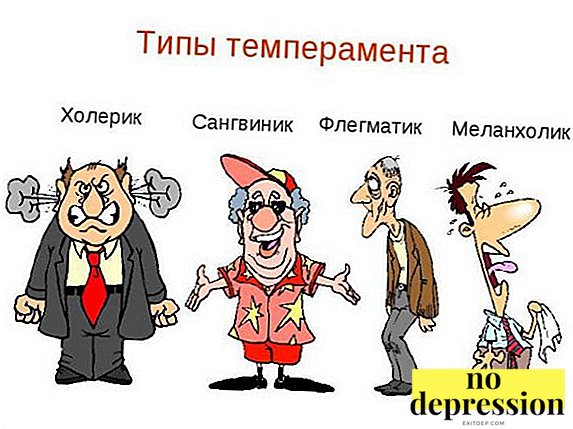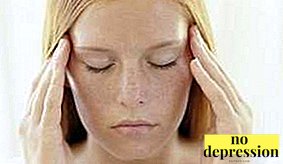Tourette syndrome is not easy neurological disease, greatly complicating the lives of people suffering from them.
The severity of symptoms depends on the severity of the disease.
Concept
 What it is?
What it is?
The disease got its name due to a scientist of French origin, who for the first time in 1885 started talking about this problem and published a report on 9 patients with characteristic symptoms.
Gilles De La Tourette Syndrome - This is a nervous breakdown, manifested in the presence of motor, voice tics.
As a rule, motor tics are multiple, and vocal-type disorders can be represented in a patient in one variant.
Syndrome mostly appears in children. The peak of the disease occurs during the adolescent period, after which the symptoms are mostly relieved. In adulthood, the disease is quite rare.
People with this problem have a normal level of intelligence, their life expectancy corresponds to the average.
However, the presence of motor and vocal tics significantly reduces the quality of life of patients, leads to social exclusion. This is due both to the high level of psychological discomfort among the patients themselves, and to the lack of understanding of their non-standard behavior on the part of those around them.
In the past existed delusionthat the disease manifests itself shouting out various offensive phrases, obscene expressions. To date, it has been found that similar symptoms occur in a smaller number of patients.
Scientific studies have proven that a large role in the occurrence of the disease play genetic factors, ecology. But unequivocally judge the causes of ticks is difficult.
Famous People With Tourette Syndrome

The presence of this disease does not prevent talented people from achieving success and worldwide recognition.
Among our contemporaries can be distinguished famous football players. David Beckham, Tim Havard.
The first uncontrollably cries out curses and cannot get rid of this feature in any way, which does not affect its star status.
The second periodically makes unconscious movements with his hands, remaining one of the most powerful goalkeepers in the world.
Californian singer Billy Eylish also has Tourette syndrome. The girl is only 17 years old, and at the same time she is the idol of millions of fans of her work.
It is known that symptoms of the disease were observed in the following famous historical figures:
- writer Samuel johnsonwhose degree of influence on the minds of contemporaries in the second half of the 18th century is difficult to overestimate;
- the emperor Claudiawho became famous not only for political achievements, but also for scientific research;
- the emperor and the legendary commander Napoleonwho kept all of Europe in fear;
- talented playwright Aviary;
- one of the most popular classical composers - Mozart.

In 2008, a film about a teacher with Tourette syndrome was released on American screens - "Before class".
Despite the small budget and unknown actors, the picture deserved considerable attention from viewers around the world.
The protagonist of the film suffers from a disease that greatly complicates his life - from time to time he uncontrollably makes harsh sounds, like a dog barking and clicking.
Despite serious problems with communication, the hero of the film does not want to shut down from society and even plans to become a school teacher. To achieve the desired goal, he has to overcome many difficulties on his way.
Tourette Syndrome in Russia
In Russia, this disease is given less attention than abroad. Because of ignorance, people often take tics or involuntary cries for manifestations of mental illness or unsuccessful jokes.
Accordingly, the main direction of development in this area is the facilitation of the socialization of people with the syndrome in society, the provision of medical care, assistance in overcoming depression and social exclusion.
Among the famous people suffering from the disease, you can select the brightest ruler in the history of Russia - Peter I.
The reasons

The exact causes of the disease are still unknown, but in most cases it plays a role genetic predisposition.
The cases of transmission of the disease from close relatives: parents, grandparents, etc. were repeatedly revealed.
Possible adverse effects during pregnancythat increase the risk of characteristic symptoms in the fetus:
- toxicosis;
- negative emotions;
- taking potent drugs;
- alcohol consumption;
- taking drugs;
- hypoxia;
- prematurity;
- birth trauma.
The manifestation and severity of the disease is influenced by social, psychological, environmental factors. In some cases, symptoms have been identified in people who have had an infectious disease.
Symptoms
There are two types of symptoms:
- Multiple Mechanical Tics. The most common options for violations - coughing, blinking. But other motor reactions are possible. The first manifestations are usually observed in children (5-6 years old): wink, tongue protrusion, frequent blinking, clapping, spitting, etc. In the case of progress of the disease, new involuntary movements appear: squats, touches, jumps, repetition of someone's actions, reproduction of indecent gestures, etc. In severe cases, there is a danger for the patient himself: hitting the head, biting the lips, eye damage. At such times there is a risk of serious injury to the patient.
- Sound tics. Tourette syndrome can also be expressed through voice. The number of variations here is also quite large.
In the most simple cases, there is a repetition of sounds, syllables that do not carry any semantic meaning. A person can squeak, hiss, scream, whistle, moo, etc.
Often, such voice violations are woven into the main speech, which from the side creates the impression of stuttering or stammering. There are also obsessive repetitions of the same words, shouting curses. During an attack, the person may change the rate of speech, manner, volume, etc. According to the patients, before the beginning of the vocal tic, they experience unpleasant sensations, provoking unexpected sounds. This may be sore throat, tingling in the eye, etc. After a tic tension decreases.


Reactions arise absolutely spontaneously.
The patient can not predict the time of their occurrence and severity.
He is also unable to influence his behavior at such a moment, as he wears absolutely uncontrollable, involuntary nature.
At children's age problems with training, behavior can be observed. At the same time the level of intellectual development of children corresponds to the norm.
Is the syndrome treated?
Tics in Toretta syndrome may occur less frequently due to therapeutic measures.
If persistent generalized reactions persist that cannot be controlled, drug therapy is applied for life.
The syndrome does not shorten life, but reduces its quality. Depression, panic attacks, antisocial behavior are often diagnosed. To the sick support of loved ones is required, psychological assistance of specialists.
If the disease is wearing weak form and does not affect the patient's quality of life in any way, medical measures may not be carried out.
So, minor motor tics in the form of coughing or blinking can be observed in childhood and completely stop at the end of adolescence.
Real photo of a person suffering from the syndrome:

How to treat?
Treatment is prescribed taking into account the patient's age, his individual characteristics, the severity of the disease. In childhood, with a weak manifestation of the syndrome, drawing helps well, music, zooterapiya.
Of great importance is the creation favorable climate around the child. A positive psychological climate in the family, the attention of parents, the participation of teachers, the help of psychologists are all important components of a successful fight against the ailment.
In the treatment of mild forms of the disease in children, a choice is always made in favor of non-drug methods that do not have side effects: acupuncture, massage, exercise therapy etc.
Of great importance is psychotherapy, during which the child is helped to overcome the emotional problems that arise, to resolve difficult social situations for him.
Medicines are prescribed to patients who, due to the severe symptoms of the disease. disrupted normal livelihoods.

In this case, antipsychotics, benzodiazepines and other drugs are used. It should be noted that their use is often associated with certain side effects.
Experimental surgical procedures for the treatment of adult patients with the help of deep stimulation.
Thus, the causes of the appearance of Toretta syndrome not fully understood. Therapeutic measures help to alleviate the condition of patients, but they do not completely eliminate involuntary ticks.
What is Tourette syndrome? Find out from the video:



